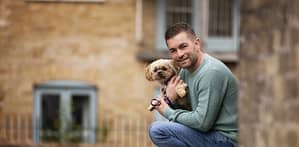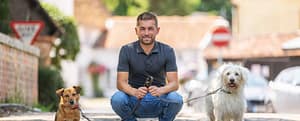With Christmas fast approaching, lifestyle blogger Victoria from Pooches & Prams asked me for my five top tips for keeping your dog calm and safe over Christmas. Victoria is a mum to toddler Arthur, baby Fleur and pug Rupert. Here is what she had to say along with my reply. I hope you find it useful!
With the countdown to Christmas now on (although part of me still wonders whether it will actually happen?!) I’ve been starting to make plans for the festive period. One thing that sprung to mind when I started thinking about all this, was what a shock to the system Christmas will be for Rupert, my dog. Normally our household sees friends, family and playdates coming and going, and our weekends are spent visiting family or having people over for lunches, dinners, brunches etc often with lots of children around and lots of dogs. This year of course none of that has really happened and now suddenly we will be able to see people again, visit different homes and be surrounded by our loved ones. Between my brother, sister and I we have 5 children, that’s a lot going on! Rupert hasn’t been around that hustle and bustle all year really and now suddenly he’s going to be thrown into quite a different environment. So I asked Behaviourist & Trainer Dogtor™ Adem from Dog-ease Training to share his tips for keeping dogs calm and safe over the Christmas period – have a read below, they are really simple and will really help Rupert I’m sure
Victoria
1. BE CONSISTENT IN HOW YOU EXERCISE YOUR DOG AND EXERCISE YOUR DOG CONSTRUCTIVELY
Although our personal routine might be a little different to normal over the Christmas period, it is important to meet your dog’s needs and still exercise your dog as usual. If you know that your household will be busier than normal with guests, you might even want to consider upping your dog’s exercise slightly (given that this is possible within their physical capabilities for their age and health). Effectively exercising your dog can both physically and mentally tire them, which in turn will help them be able to settle and relax throughout the day despite the change in their day with people perhaps coming into your home or even maybe visiting another household. This is particularly important if your dog is not used to guests and a busy household (I mean, who is at the moment!) as some dogs can find a change from the norm unsettling.
Think of your exercise session as a workout! Include a warm-up, main activity and a cool down. For a physically able dog in their prime, this might look like a brisk walk, followed by a game of fetch, before ending in a mooch, social, and sniff around a park/green space and a gentle walk home. Remember to tailor your exercise sessions to your dog’s physical capabilities and age.
2. GIFT A TOY FOR CHRISTMAS THAT SUITS YOUR DOG’S LIFE STAGE
As dog lovers, we all love to buy our dogs presents and spoil them. Make the most of the festive spirit of giving by choosing a toy that your dog will really enjoy and will also help to keep entertained over the festive period.
A very young puppy might most enjoy what I like to call ‘explore’ toys. These come in all shapes and sizes and help a puppy to use their senses and explore using their mouths. Think of this as the equivalent to a teething or sensory toy for a baby or Playdoh and Lego for a toddler. An adult dog might, on the other hand, enjoy a ‘chase’ style toy, chew toy or food dispending toy. Think about your dog’s energy levels when choosing a play toy, some are of course more energetic than others! For a senior dog, think about their health and physical capabilities and what they enjoy most in life. My old Yogi loves a teddy to carry around and also loves a senior designed food dispensing toy – his favourites are the senior Kong (stuffed with Turkey this time of year of course!) as this is made of softer rubber than the standard Kong, and he also loves a large ball style food dispensing toy he can easily move with his nose to roll so the treats fall out for him to retrieve!
When buying a toy think of what will be useful for you and your dog over the festive period, perhaps keeping them entertained whilst you greet guests at the front door or when you would like them to settle on their bed whilst you open presents or eat your Christmas dinner. You can also buy a range of eco-friendly toys that make wonderful gifts and are made by small businesses who will benefit hugely from your support in the current climate.
3. CREATE A ‘BASE’ OR QUIET AREA FOR YOUR DOG TO SAFELY RESIDE
If your dog hasn’t already got a designated ‘base’ area you may want to consider making them one for the festive period – and perhaps even beyond. As mentioned previously, some dogs can find a change in routine or a busier than normal household unsettling. They might also not be used to babies and children visiting and the energy they can bring or the on the low-level nappy changes, loud noises (think champagne corks popping, party poppers, loud cheering and singing for example), or even flashing lights from Christmas decorations. Creating your dog a safe place to reside can help to keep your dog calm, reduce their exposure to things that might perhaps otherwise cause them anxiety, and allow them to rest when needed. Creating a base area can also help you to monitor your dog’s interaction with any children you may have in the household or visiting your home for Christmas, keeping everyone safe from unwanted prods, advances, unintentionally clumsy feet and paws, potential mouthing or bites, and also your dog being fed inappropriate food or even taking it from small hands.
A base or quiet area does not have to be complex. Think about your dog’s needs. It could be as simple as a bed in a corner of a quiet room, a dog crate or penned off area, or even a stairgate to allow your dog to roam freely in a designated room. Just like children, our dogs need to be kept away from harm, be allowed the opportunity to express their natural behaviours, and also rest when needed. If your dog is usually by your side and struggles to be away from you, perhaps suffering from separation anxiety, think about what is most appropriate for your dog in terms of a base in order to help reduce any stress they might feel if asked to be physically away from you over the festive period. You might want to start to work on this now, perhaps enlisting the help of a behaviourist.
You could also choose to have your dog on a lead by your side during the day if necessary and, if you have small children visiting, you could also make a fun game of teaching them the basic rules around interacting with dogs. I always suggest teaching children to respect a dog’s sleeping area, not approach their food bowl or when they’re eating, and remember that dogs don’t always like to share toys! A good place to start is to teach children to always ask an adult and remember to call a dog to them. If the dog is happy to come when called by the child this can be a good indication that they are happy to interact, however if they ignore, they may be wanting to rest and be left alone.
4. CHOOSE DOG FRIENDLY TREATS TO REWARD GOOD BEHAVIOUR AND KEEP HUMAN FOOD OUT OF REACH
High value treats are a must if you’re introducing your dog to out of the ordinary experiences and social activities. Starting slowly, maybe at distance, and allowing your dog to acclimatise to what is happening is a good place to start if you’re unsure of how your dog might react to any out of the ordinary experiences over Christmas. Praise with your voice and offer tasty treats (or even maybe a succulent morsel of turkey!) as a reward for calm and accepting behaviour from your dog. You can also stuff food dispensing toys with tasty treats or meat such as turkey and offer this in their base or bed area to encourage calm, settled behaviour.
Human food, although tempting to give, should largely be avoided. Whilst meat and most vegetables can be offered if you wish, remember that it is key to keep a check on your dog’s diet over the festive period so that they do not end up consuming too much and putting on weight, which could be detrimental to their health. It is also important to ensure that your dog still achieves a complete diet with all the right vitamins and minerals in the correct quantities. A good quality dog food given in the right quantities will ensure this happens but if we are offering alternative food from our own plates this is unlikely to be achieved.
Foods high in salt, fat and containing dairy should most definitely be avoided, as should raisins, grapes, chocolate and anything containing alcohol as these are poisonous to dogs and could even cost them their life if consumed. If you notice that your dog has eaten something they shouldn’t have, call your vet straight away as urgent medical care might be required. Think not only about the food you are physically feeding your dog, but also any food that may be accidentally dropped on the floor by children or other guests, is accessible to or in reaching distance of your dog, or even perhaps wrapped up under the Christmas tree. Dog’s noses are extremely powerful, approximately 40 times greater than ours, and so you can be sure they’ll be able to sniff out the tiniest crumb even when beautifully wrapped in your nan’s favourite glittery wrapping paper!
5. KEEP CHRISTMAS DECORATIONS AND PLANTS OUT OF YOUR DOG’S WAY
Many Christmas decorations can seem like super fun to your dog – flashing lights, tinsel that rustles, baubles that look like balls! Just like we protect our small children from choking on and harming themselves through playing with or putting unsuitable items in their mouths, as responsible ‘pawrents’ we must do the same for our dogs also. To help keep your dog safe, consider placing decorations at a level higher than your dog can reach and, if your dog seems particularly interested in the Christmas tree, consider using a barrier around the tree. A portable baby gate works wonders or, if you’d like something a little more festive looking, you could create a festive barrier by placing heavy items in large boxes and wrapping them up to look like presents before then positioning them around your Christmas tree (also great for stopping small children being able to access the tree – thanks Big Little Feelings https://biglittlefeelings.com for the idea!). You can also limit access to heavily decorated rooms to only when being directly supervised if necessary. If in doubt, don’t take the risk.
Similarly, plants can be of interest to your dog and with some plants proving toxic it’s best to remove any temptation to ingest them by keeping them on a surface or ledge that your dog cannot access. Poinsettias are an example of festive plants many of us have in our homes and, although these are only ‘mildly’ toxic, they could still cause a stomach upset – not what you want to be dealing with on Christmas day!
So there you have it, my five top tips for keeping your dog calm and safe over the Christmas period. In fact, many of these tips can be applied to any celebration or busy time of the year for your household. I hope you find my tips useful.
Dogtor™ Adem


